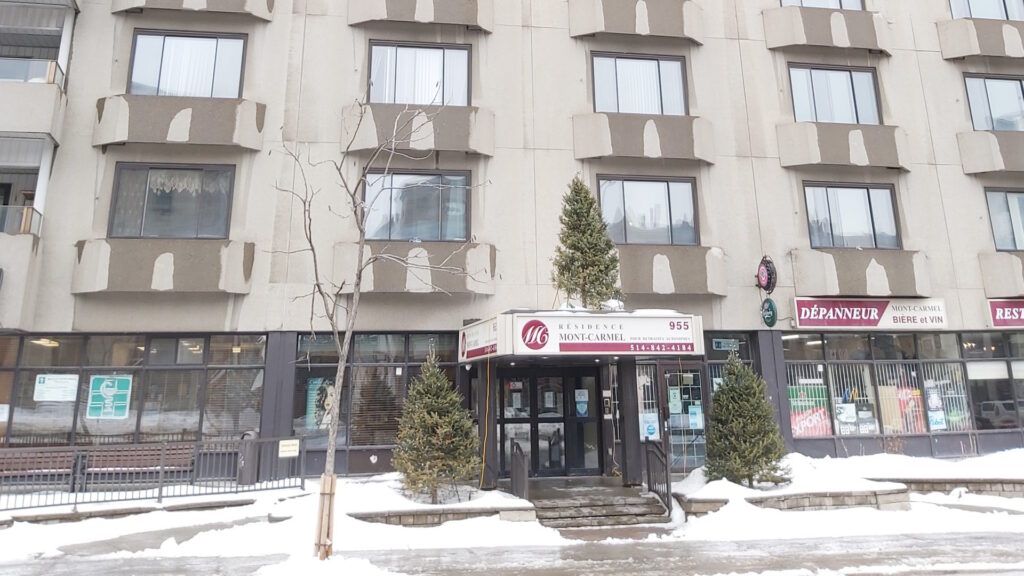In June, the CAQ boasted that it had adopted a 3-year moratorium on evictions to support the population in the face of the housing crisis. According to Marie-Frédérique Saint-Onge, coordinator of the Comité d'action des citoyennes et citoyens de Verdun (CACV), it was the tenants' rights organizations that made the CAQ fold.
This measure, which only pauses evictions for extensions, subdivisions and changes of occupancy of dwellings, comes after major mobilizations to denounce the Minister of Housing and real estate developer France-Élaine Duranceau and her Bill 31, which attacked lease transfers, one of the last tools left allowing Quebec tenants to limit rent increases.
Although the new moratorium has significant blind spots, many tenant organizations see it as a victory. Last year, the CACV led a campaign along these lines. The organization called for a moratorium on renovictions, which allow landlords to justify evicting tenants by enlarging or subdividing an apartment.
Saint-Onge explains to North Star, "we turned to our elected municipal officials to ask them to stop issuing permits that could lead to the eviction of tenants when we were in the midst of a housing crisis. And to this day, we haven't had a satisfactory response."
"So of course, we're happy to know that there are some tenants who will be able to be protected thanks to the implementation of a 3-year moratorium on the provincial side."
However, the absence of evictions for repossession in the moratorium has been criticized by tenant advocacy organizations. These are supposed to enable a landlord to evict a tenant in order to house himself or a family member.
However, this practice is poorly supervised by the Tribunal administratif du logement (TAL), and many landlords use it illegally.
Saint-Onge sees many such cases in Verdun. For example, "one landlord gave out 6 eviction notices for repossession to 6 tenants in the same sixplex for the same son. These are not isolated cases, and they represent the vast majority. I think we've had 118 this year alone."
The absence of specific protections for residences for the elderly (résidences pour personnes agées, or RPAs) in the moratorium was also denounced. Mass evictions from RPAs under the pretext of conversion to rental housing have increased dramatically in Quebec in recent years.
According to a study by the Association québécoise des retraités des secteurs public et parapublic (AQRP), between 2022 and 2023, 88 RPAs closed their doors. Over the same period, more than 2,500 seniors were evicted from their RPA housing.
François Saillant, former spokesman for the Front d'action populaire en réaménagement urbain (FRAPRU) points out that "there are no exceptions in the RPA bill. The CAQ mentioned the fact that small RPAs are closing, which is only part of the truth. Really they're being forced to transform in some way."
"The problem is that no one is going to buy them because of the requirements and certifications needed to run them, which are extremely expensive. Nobody, except speculators like Henry Zavriyev who want to turn them into rental housing." Zavriyez made a name for himself in 2021 by evicting the 63 residents of RPA Mont-Carmel in Montreal immediately after buying the building.

With regard to the application of the moratorium, Saint-Onge warns against the widespread illegal practices of certain landlords who continue to act with impunity.
"I know that the moratorium was put in place very recently, but we still have renovation cases where people will pressure tenants to sign, they'll harass, they'll threaten or they'll exhaust their tenants by doing work for which they don't necessarily have a permit. It's forcing people out of their homes."
Though the moratorium may not offer total protection, Saillant sees it as proof that tenant mobilization can bear fruit. "I think we have to claim this victory. The government didn't want this."
"If there hadn't been the fight there was over Bill 31, if there hadn't been so many organizations mobilizing, so many people on several occasions taking to the streets, the CAQ would never have conceded this measure."
But the lack of a long-term solution remains a problem for Saint-Onge. "I don't think this is a victory we can sit back on as a society, and we can't give up our fight for housing rights, because the whole system we live within is built to enrich the well-off. We're going to have to keep up our efforts to help those who have been left behind."
- CAPREIT extracts as much money as possible from their tenants
- A Law Written for and by Landlords
- The Legault Government Launches an Attack on Tenants
- A Campaign for a Moratorium on Evictions
- When Politics and Business Violate Tenants’ rights
- Real estate developers reinforce shortage by reducing housing starts
- What effects will the adoption of Québec’s Bill 31 have?
- Housing bill continues to be denounced by unions and housing groups
- Conflict of interest for Quebec’s tenant-landlord tribunal?
- One year later, tenants still standing up to excessive rent increases
- Developers paying pennies to bypass affordable housing requirements in Montréal
- Build, but at what cost to tenants?
- A First Victory for Quebec Tenants Against the CAQ
- “Montreal attacks the homeless instead of homelessness”


